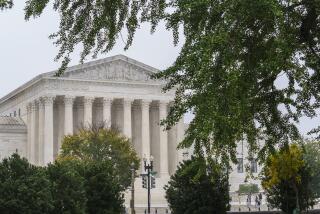AOL Wins Important Victory in Fight Against Junk E-Mail
- Share via
A federal judge handed America Online a new weapon to battle junk e-mail Monday in a ruling that could help Internet service providers shut down companies that send legions of electronic advertisements for pornography and get-rich-quick schemes.
The ruling is seen as an important element in the long-term battle against junk e-mailers--popularly known as “spammers”--because the threat of legal action has shut down high-profile offenders in the past. But the immediate impact for millions of Internet users is expected to be slight, as it will take some time for the courts to resolve the issue and for the threat of litigation to reach the thousands of small-time spammers that have flourished recently.
U.S. District Judge Gerald Bruce Lee ruled that LCGM, a Michigan company that uses electronic mail to promote pornographic sites on the World Wide Web, committed fraud by sending e-mail to AOL’s 15 million members despite AOL’s prohibitions against it.
The courts have generally recognized that spammers are guilty of trespass when they use an Internet service provider’s computer network to distribute their messages without permission. In his ruling, Lee said the same behavior also constitutes fraud under the federal Computer Fraud and Abuse Act, according to Randall Boe, AOL’s associate general counsel.
“This is one of the first--if not the first--case to specifically say that these tactics are a type of fraud,” said Ray Everett-Church, co-founder and counsel for the grass-roots Coalition Against Unsolicited Commercial E-mail in Washington. “It certainly does add another clear tool to ISPs’ arsenal against spammers.”
The phone at LCGM’s Madison Heights, Mich., office was disconnected Monday and company representatives could not be reached for comment.
Like many Internet service providers, AOL has set up an elaborate system to filter out junk e-mail. But dedicated spammers can often outmaneuver those filters with programming tricks.
David Johnson, co-director of the Cyberspace Law Institute in Washington, said the ruling shows that existing laws can be put to use to tackle new problems such as junk e-mail.
“If somebody is putting up generally accepted mechanisms to restrict access, and then someone else intentionally deceives that system, I think that’s a reasonable interpretation of what the Computer Fraud and Abuse Act was intended to accomplish,” said Johnson, who also leads the E-group in the Washington law firm of Wilmer, Cutler & Pickering.
AOL’s Boe agreed that spammers and hackers are really of the same ilk. “They engage in a whole range of fraud and deceit in order to gain access to different computer networks.”
America Online has long argued that spammers should be found guilty of fraud in addition to trespass. As the largest consumer provider of Internet access, America Online is often on the leading edge of efforts to fight spam. AOL filed suit against LCGM in January.
Although the ruling in the Eastern District of Virginia is not an official precedent, Johnson said it could affect the decisions of other judges around the country.
“There are so few cases that any guidance on this matter has the potential to influence lots of other courts,” he said.
America Online on Monday also announced legal victories against two other spammers: Prime Data Systems of Bowling Green, Ky., and IMS of Knoxville, Tenn.
In addition, AOL said it filed nine new lawsuits against alleged spammers in California, New York, Virginia, Florida and Iowa as part of an effort to establish legal precedents against junk e-mail around the country.
In California, AOL sued USA Home Employment of Studio City, Michael Persaud in San Diego and a ring of e-mailers in Sunland and Tujunga. None of the defendants could be reached for comment.
Shares in America Online jumped 12% on Monday, gaining $12.75 to close at $117 on the New York Stock Exchange.







